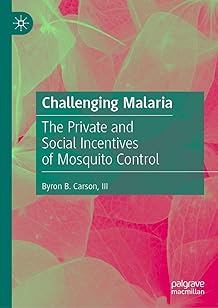 Titled Challenging Malaria: The Private and Social Incentives of Mosquito Control, the book develops a theory of collective action and its relevance to the issues of mosquito control and malaria prevention.
Titled Challenging Malaria: The Private and Social Incentives of Mosquito Control, the book develops a theory of collective action and its relevance to the issues of mosquito control and malaria prevention.
“The book is my attempt to think through how externality and collective action problems hinder mosquito control and malaria prevention,” Carson said. “I drew on a robust literature in economics on collective action, civil society, and self-governance to understand these problems and to think through solutions.”
As a graduate student at George Mason University and during his tenure at Hampden-Sydney, Carson developed a keen interest in the complexities surrounding public health and malaria. Diving into economic concepts such as externalities and collective dilemmas, he became intrigued by the possibility of individuals overcoming these hurdles to implement effective mosquito control measures and reduce the spread of malaria. Through his research and the publication of this book, Carson examines these complexities, exploring instances where collective action overcomes obstacles to enhance public health.
“The role of people facing diseases and whether or not they can help is important for how people advance the interests of public health, especially in areas afflicted by infectious diseases like malaria,” Carson explained. “How we lessen the burden of these diseases depends on how we analyze its spread and how people respond to the problems addressed in the book.”
Carson reflected upon the progress made in formulating the theory and structure that connect collective action, mosquito control, and malaria. Intrigued by the multitude of narratives surrounding mosquito control efforts, he found satisfaction in aligning these narratives in the framework he had crafted. Additionally, he drew upon a plethora of concepts and insights from various scholars to enrich the development of his book.
“Leland Howard was an entomologist who recognized some of the problems of collective action, but his insights were never fully developed," Carson said. "Mancur Olson formalized the idea of collective action in social science, yet few recognize its applications to malaria. Finally, I draw inspiration from Elinor Ostrom, who encouraged scholars to consider how people use collective action to resolve the problems they face.”
As a skilled and devoted faculty member, Carson stands among those who constantly work to analyze and offer solutions to real-world problems. While publishing is a remarkable accomplishment, Carson finds pleasure in being a part of the conversation and motivating students to act in their personal endeavors.
“It is such a privilege to spend time discussing and writing ideas,” Carson said. “Now that I am contributing more to these conversations, I hope students will be interested too. My ultimate hope is that students will see the general argument, not necessarily about collective action and malaria, and realize they can use the framework of collective action to better understand topics they are interested in.”
Read more about the book:
Challenging Malaria: The Private and Social Incentives of Mosquito Control